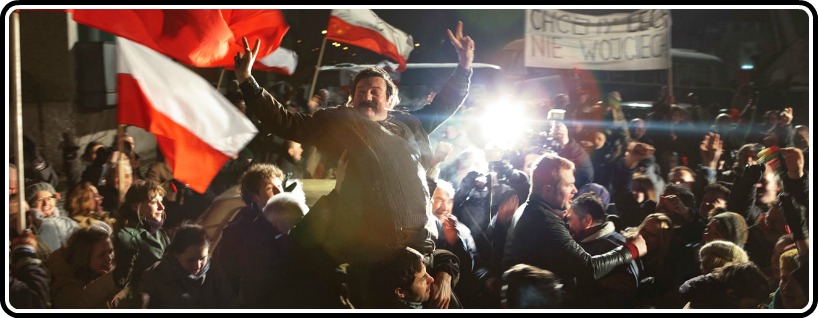In an age where directors like Alain Resnais and Manoel de Oliveira can be working as active filmmakers well into their 90s (and in the case of the latter, past age 100), we have the great pleasure of seeing some of history’s greatest master directors work on their craft for decades after decades. One of cinema’s elder statesmen is himself back with a new film, a look into the life of one of Poland’s most important and influential figureheads.
Now going into his late ’80s, Andrzej Wajda (best known for films like Ashes And Diamonds) is back with a new picture entitled Walesa: Man Of Hope. Looking at the life and times of legendary Nobel Prize winner and former Polish President Lech Walesa, the film is told in a relatively standard way, as we are privy to an interview Walesa is giving to a chain-smoking journalist. Through this series of flashbacks as Walesa tells us his rise from electrician to the most powerful trade unionist on the planet, we learn about the man that would become president of his beloved Poland, his ever growing family, and most interesting, his relationship with his loving wife. These sequences are set opposite an ever hectic life in the public eye Walesa lived, becoming a figure head for the trade unions in Poland, and the Solidarity movement that took the nation by storm. With the liveliness and vitality of a Greengrass-esque political thriller and the naturalisim in the performances of a neo-realist picture, this is a standard biopic in structure, but a film of supreme aesthetic skill and filled with even greater performances.
While Wajda gets the lede, it is the pair of lead performances that make this film unforgettable. Robert Wieckiewicz stars here as Lech Walesa, and turns in an absolutely superb performance. Fully fleshed out thanks to Wieckiewicz, we feel the urgency and the strength of conviction that turned this electrician into a man so influential that, as shown by the end of the film, the falling of the Berlin Wall was nothing more than blip in this man’s wake. Even better? Taking on the role of his wife, Danuta, is Agnieszka Grochowska, turning in one of the best performances of this still very young year. It’s a hyper-natural performance, seemingly coming directly from the heart and soul of Grochowska, and not only does she go toe to toe with a ferociously raw Wieckiewicz but she adds the real emotional heartbeat to the picture. Supremely told by Wajda, the film has a rather standard structure, and while the aesthetic is indeed thrilling, these two tactile performances ooze a sense of naturalism that, opposite a score full of anachronistic rock music and stock footage, really helps elevate the film’s overall attempt at crafting a raw universe to put these influential historical figures in.
That all said, Wajda is no slouch. Tinted with icy cold blue and greys, the film has an urgency and raw energy that would be found in the camera of a director half Wajda’s age. The rock-heavy soundtrack adds a lot of energy to the stock footage sequences, and while the interview segments are dull and relatively uninteresting, the moments in between are so percussive that they give the film, a two hour historical drama, the energy of an 80-minute action film. The riot sequences in all of their anarchic beauty are the real highlights here, particularly when opposed by Walesa’s ever growing family and the struggles faced by he and his wife back home, the real gems of the picture. With these stock footage sequences taking some of the naturalism of the film out of its tanks (particularly when you see the lead superimposed into some of the footage), you never feel truly transported to this universe, but thanks to an ever lively camera and a master director behind it, Walesa is a stand out biopic in the structure of a standard historical drama. A tough watch for those uninterested in social politics and world history, this may not be everyone’s cup of tea, but for those who give themselves completely over to this gorgeous picture there won’t likely be much more of a rewarding experience.



